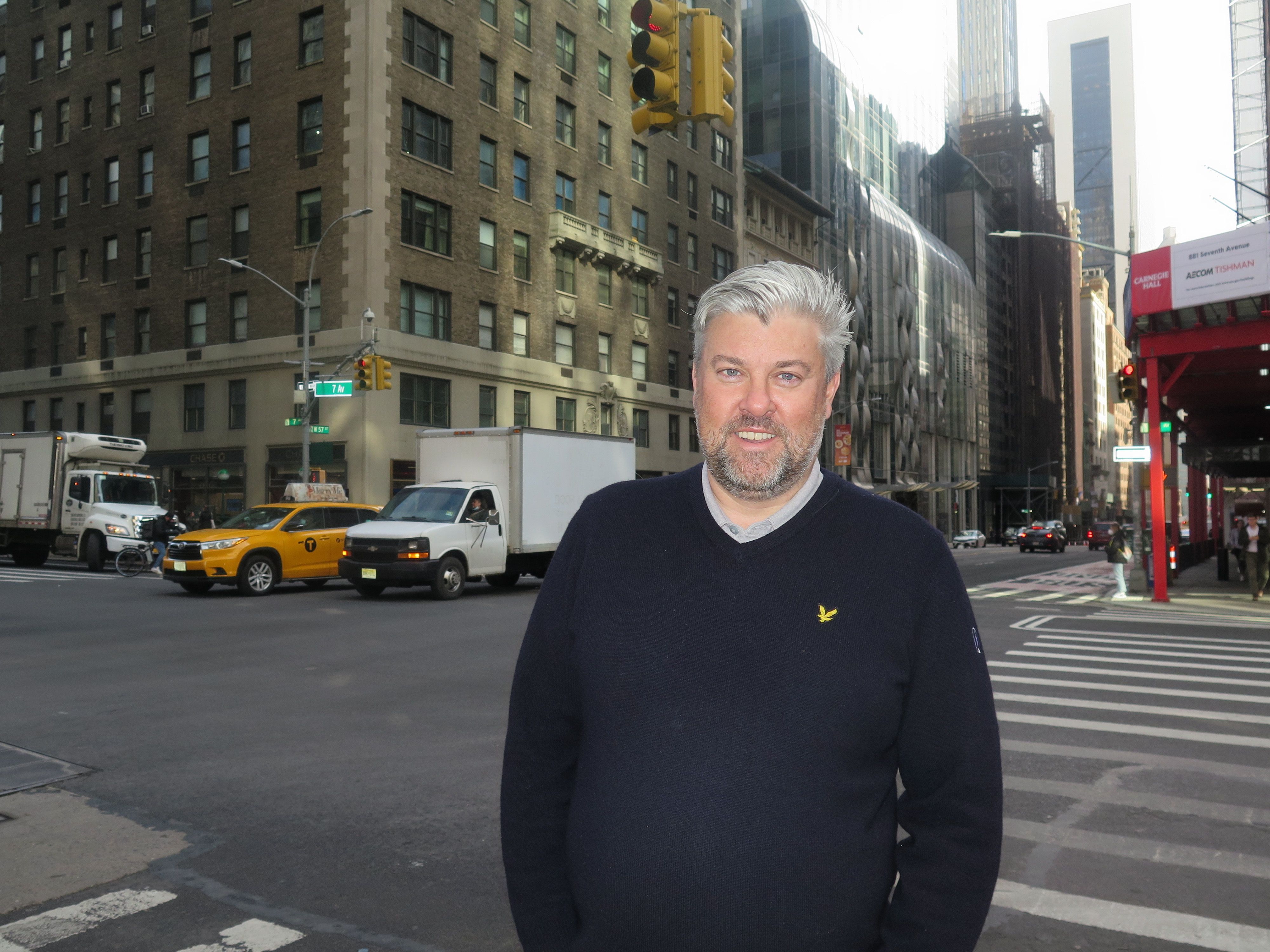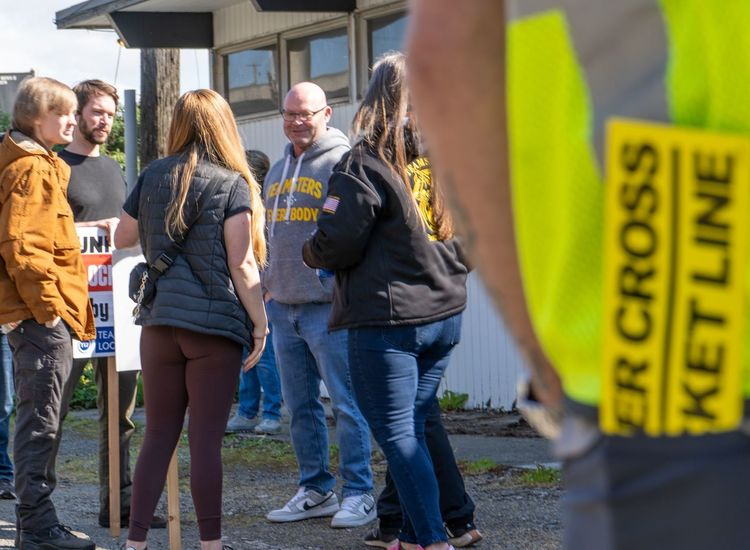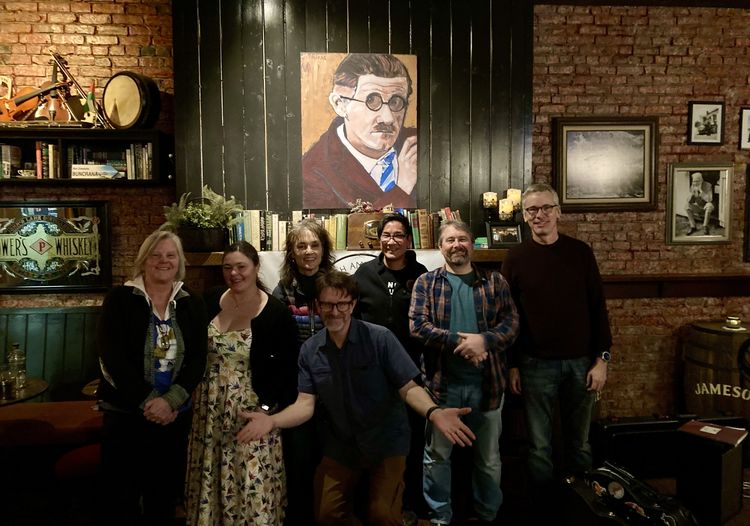“Belfast has a certain swagger.”
That’s the view of Ballyhegan, Co. Armagh, native Gavan Corr, the managing partner of Qarik Group in New York.
The past Irish Echo 40 Under 40 honoree extols its strengths as a location for business, but he also says that its young people do extremely well when they travel to work overseas.
The two phenomena have the same basic explanation: Queen’s University and other institutions of higher learning.
“The fundamental education system is first class, and the quality of the graduates is first class,” Corr said. “And there is a work ethic and a determination to succeed.
“You could see even in Silicon Valley the quality of the graduates coming out of Queen’s and Jordanstown [University of Ulster, where he did a postgraduate degree at the Ulster Business School] were absolutely more than able to hold their own with your Stanfords and your MITs,” said Corr, who worked in the financial technology sector in Vienna, Stockholm, Frankfurt, Paris, Hamburg, Palo Alto, Calif., and London before moving to New York, where he’s been since 2003.
“It’s a mindset,” he said.
“The attitude that ‘we can do anything’ blossomed, and the culture changed massively from the mid-to-late ’90s forward,” he said, adding that factors like the peace dividend and European Union money were a big help.
The influence of the late Brian Conlon, the founder of First Derivatives, is central to the story, he believes
“Brian was the first guy that really pushed Northern Ireland, and Newry in particular, as a place that you could go out from and compete globally,” Corr told the Irish News in 2020.
Last week, he added, “Brian had worked in London with J.P. Morgan and was doing some software development and he said ‘I can do this better from home. I can find the people coming out of Queen’s.’ The caliber was stronger than the people he was seeing in London.
“He found some smart people and he found me as well,” said Corr, who managed the company’s Morgan Stanley, JPMC and Bank of America accounts.
Being straight out of college and in at the “deep end” in a city like Vienna, in his own case, was part of the process that “gave us the belief that we could compete with anybody.”
He cited, too, the active roles taken by politicians like Peter Robinson, the late Martin McGuinness and Arlene Foster in bringing in business, including from companies he’s been involved with, such as NYSE Euronext and Cowen investment bank. The NYSE had acquired Wombat, a company that was led by another Queen’s graduate and former First Derivatives employee, Danny Moore, and its move into Belfast was the biggest inward investment project in Europe that year.
“Invest Northern Ireland have always been a great partner for us in terms of investment,” Corr said. “They’ve done a fantastic job in terms of putting a support system around people who are looking at that. They will talk to people who’ve come in; they will talk to people who’ve been successful; they will talk to recruitment companies.
“They make that journey easier. You don’t get that support in a lot of places.”
Corr has been leading the way in recent times, as a couple of media reports revealed.
The Irish News, first of all, said on Sept. 3, 2020, that Qarik would set up in Belfast, creating 50 jobs.
“The fast-growing company provides cloud-based data management and analysis software development services to corporate customers in the U.S., including banks and financial services companies,” the News reported.
“Based at River House on High Street, Qarik has already recruited 37 people for its research and delivery hub in Belfast, most of them software engineers and data scientists.” Qarik reached its job-creation target there, and the other half of the company’s workforce of 100 is based in U.S. cities.
Then, later that month the News also reported, referring to Corr, “A throwaway remark in a New York boardroom last October by an Armagh-born former employee of First Derivatives in Newry prompted the boss of a Chicago technology and investment firm to jump on a plane to Belfast within just 24 hours.
“And Judi Hart [chief operating officer at PEAK6] admits to being ‘so hugely impressed’ with what she found that she immediately convinced her company to establish a center of excellence in the city, which is creating 160 jobs paying an average salary around the £50,000 mark.”
Access to the First Minister and Deputy First Minister and the ease with which visiting business people can get meetings with the right people, like the economy minister, are big pluses. “You can’t get lost there,” Corr said.
In the U.S., the different size and scale mean there are other forces and advantages at play. Being involved with the Irish-American network — which, he said, “has always been personally very supportive to me” — might lead to meeting someone who works for the world’s biggest bank, for instance.
“A warm introduction can go an awful long way here,” he said.
Asked about favorite places of those he worked in during the first years of his career, Corr listed two: London, working in finance there was a “really interesting experience” in the late 1990s; and Stockholm, a “phenomenal city,” he said, and recommends Sweden as a place to visit to anyone who might get the opportunity.
Corr said it’s important to be aware of differences in culture, and suggested that being from a divided society might even be an asset for the young executive moving from one business environment to another.
“Growing up at home you were always aware of cultural differences, in some ways a ‘them and us,’” he said. “And that probably helps you when you go to work in a place where you’re not aware of the culture. Because you’re somewhat culturally sensitive inherently. I think that helps people adjust.”
Austria, he recalled by way of example, has a “rigid” culture. “In banking the concept of ‘four eyes,’ always oversight of things. Germany and Austria have that policy; everything is checked by someone else the whole way through the process. As a result they’re very conservative. In finance, they like the fundamentals. They like doing the things that are low risk and they are always very risk aware. Switzerland is something similar.
“They’re risk aware here [in New York], but they’re much more willing to embrace something new or different or change in a way that some of the older cultures in Europe don’t,” he said.
The most fascinating cultural difference for him, though, is that between the East Coast and the West Coast in the U.S.
Said Corr, who before setting up Qarik with his business partner Joe Schenk worked for two and half years as Principal of Financial Services at Google Cloud Platform, “From a mindset difference. Google culturally is very new. There’s a thing in Google ‘fail often and fail fast.’ It’s a badge of honor to try multiple things that don’t work because you learn a lot from those experiences. And the thought process in Google always emphasizes the idea of 10x. Whatever you’re doing should be 10 times better than what’s there or have the possibility to be. That encourages innovation and new ways at looking at things.
“In a very regulated world of Wall Street you can’t take on those changes. You have so much regulation, so much oversight and compliance in a way that’s not an issue for Google or Amazon or Microsoft.”
So, there is “always a cultural battle somewhat between the business of banking and the capability of the technologies,” he said.
“Here on the East Coast, it’s about getting something right and making sure that it works. You wouldn’t take on 10 projects and expect one of them to work; you would take on five and expect all five of them to work. Whereas on the West Coast you take on 10 and if one works, you’re brilliant.”
As for the future, and people’s anxieties about where Big Tech is taking us, he said: “The technology itself is never the problem. We’ve always innovated as a species. There’s always been an improvement. There have always been bad actors.
“The rate at which technology is accelerating right now is breathtaking, the amount of data we generate and capture is huge. And sometimes the social media can be an echo chamber for that,” said Corr, who lives in New Jersey with his wife Aveen and their sons Matthew, 15, and Dara, 13, and daughter Maeve, 11.
“We evolved to deal with small villages, and we knew 100 people tops,” he said, “and now we’re in this situation where people have millions of followers.
“Now we have companies choosing what you hear and don’t hear and it’s usually to congratulate you on your opinion and that’s not a good situation. We haven’t got the hang of social media, yet, for our own well being,” said the fan of the Armagh Gaelic football team and Liverpool F.C.
“We are getting better, I think, at privacy. Google and Apple over the last couple of weeks are taking good steps in that direction. People, I think, will crave more privacy. People will hopefully start looking for more than one opinion or one source for their news. And hopefully people will realize that they shouldn’t make a very public statement about things they aren’t qualified to. But that’s all a while off.
“There’s enough data and computing power available that we should be doing things that actually advance humanity,” Corr said. “And right now, we’re not doing a good job at that.”









